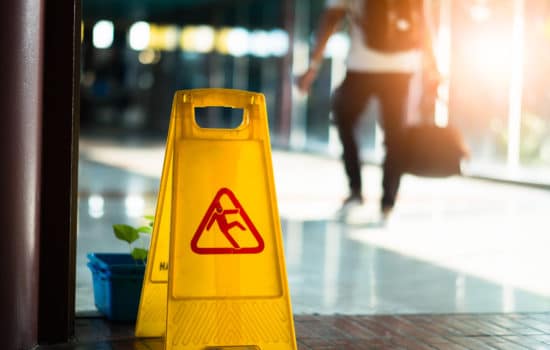By: Kevin P. McRoy, esq. | Partner
 You are owed money. You have made demand. That didn’t work, so you brought a lawsuit. Maybe you have even received a judgment. Just when you think you’re finally there, you receive a telephone call, or a letter from an attorney, or a notice from the court – the party that owes you money has filed for bankruptcy. Now what? Is all hope lost? Should you just throw your hands up? What should you do? Is there anything you can do?
You are owed money. You have made demand. That didn’t work, so you brought a lawsuit. Maybe you have even received a judgment. Just when you think you’re finally there, you receive a telephone call, or a letter from an attorney, or a notice from the court – the party that owes you money has filed for bankruptcy. Now what? Is all hope lost? Should you just throw your hands up? What should you do? Is there anything you can do?
The Bankruptcy Code is an extremely particular area of the law. The Bankruptcy Court, a branch of the federal court system, is the authority charged with implementing the Code. It is a completely different arena than the civil and criminal courts which people most often deal with. Once somebody (or some entity) files for bankruptcy, a creditor can often automatically think that the debtor is “broke” and that any hope of collection is effectively lost. However, this is not always the case. The nature of the money owed to you, the type of assets owned by the party that filed bankruptcy, and even the type of bankruptcy filed, can affect your ability to collect. Sometimes, the bankruptcy filing, itself, can actually serve to speed up recovery in certain instances.
The Type of Claim
There are essentially three different types of claims which a creditor can hold: secured, unsecured, and priority. The holder of a secured claim is a creditor which received collateral or otherwise has some type of lien on the assets of the debtor. For example, when people buy a home, they often get a loan from a bank, giving the bank a mortgage as collateral for the repayment of the loan. That mortgage lender is the holder of a secured claim. If need be, the bank can look to the property (and sell it via foreclosure) in the event of default or breach in repayment. Other types of secured creditors include parties that have received attachments (whether on real property or otherwise), and other types of creditors, such as a contractor which is owed money and has protected itself through compliance with the Massachusetts Mechanic’s Lien Statute.
An unsecured claim is the exact opposite – there is no collateral or lien which secures the money owed by the debtor. The classic example of an unsecured creditor is a credit card company. Other examples can include parties that are owed money pursuant to contracts, personal loans from family members, etc.
The third type of claim, known as a “priority claim”, is technically an unsecured claim. However, this type of claim receives treatment (and, if possible, payment) prior to general unsecured claim holders (addressed above). The most common examples of this type of claim are claims for unpaid taxes.
The Most Common Types of Bankruptcy Filings
The type, or “chapter,” of bankruptcies which are available depend on several factors: whether the party is an individual or a corporation; the amount of debt which the person or entity owes; the type of debts owed (secured or unsecured); and, even whether the debtor has filed before and, if so, how long ago.
The Chapter 7 Bankruptcy:
The Chapter 7 bankruptcy has historically been the most common type of case. It is, by its very nature, a “liquidation” case, meaning that all non-exempt assets of the debtor are liquidated, or sold, and turned into cash. Any creditors whose claims are secured by the property sold are paid first from the proceeds. If any funds remain, or if there were no liens on the assets sold, those funds would then be used to pay expenses of the bankruptcy estate (trustee fees, commissions, trustee’s attorney’s fees, etc.), and any amounts remaining would then be distributed to priority unsecured creditors and then to unsecured creditors (or at least those who have filed proofs of claim). Many times, a Chapter 7 case is designated as a “no asset” case, meaning that it is anticipated that there will not be any monies available for distribution to unsecured creditors. Both individuals and entities (corporations, LLCs, etc.) can file Chapter 7 bankruptcy petitions.
The Chapter 13 filing:
The second type of most commonly filed bankruptcy petitions is a Chapter 13 petition. Chapter 13 bankruptcy cases are appropriate for individuals with regular income and who have secured and unsecured debts below certain levels. In this type of bankruptcy case, the Debtor will effectively file a “plan” to pay certain claims over a period of time (usually three or five years). Essentially, the excess amount of the individual’s income over expenses is paid to the Chapter 13 trustee (the party assigned with administering the case) on a monthly basis. If an individual does not have a surplus of income over expenses on a monthly basis, he or she is generally not an appropriate Chapter 13 debtor. This type of bankruptcy is not available for companies or corporations – only individuals with regular income.
A Chapter 11 case:
Oftentimes, we hear of companies which have “gone Chapter 11.” This does not mean that the company is going out of business – in fact, it is often the opposite. A Chapter 11 bankruptcy is, quite basically, a reorganization. The company continues in business while its debts are restructured. A Chapter 11 case is complex in nature, as a debtor will propose both a disclosure statement and a plan by which the Debtor proposes to pay its debts, or a portion of its debts over a period of time. The length of the plan will depend upon what payment terms are proposed and the debtor’s ability to generate income. Both businesses and individuals can file Chapter 11 cases.
How Do You Protect Yourself?
What do you do if you find out that a party that owes you money has filed for bankruptcy? Do you go it alone? Do you hire an attorney? It is your decision if you want to hire an attorney. There are particular deadlines by which certain things must be filed (i.e. proofs of claim). There are also certain opportunities that parties have to question the debtor as to assets or how they intend to proceed in the case (such as attendance at a 341 creditors meeting or otherwise taking an examination of the debtor pursuant to Bankruptcy Rule 2004). There is also a finite period of time in which a creditor can file what is called a “proof of claim” in the bankruptcy case. It is critical to note that if there is a deadline for filing a proof of claim and the proof of claim is not filed by that date, and a motion to extend the time for filing a proof of claim has not been filed or allowed, the ability to collect at all from the debtor can be, and is most often, lost.
Are There Any Benefits To the Bankruptcy Filing of a Party That Owes You Money?
Strangely enough, there can be benefits to a bankruptcy filing by a party that owes you money. Pursuant to the provisions of the Bankruptcy Code, a debtor is required to prepare, under oath, and file bankruptcy schedules and statements. These schedules and statements provide some information as to what assets and debts a debtor has, what income they have had over the preceding years, and what claims they may have as to third parties which might entitle them to payments or other assets. Other times, under certain circumstances, the trustee involved can bring claims against debtors in appropriate cases to have assets or payments returned to the debtor. All of these possibilities can lead to an increased payment to the creditor under the right circumstances.
In short, is a bankruptcy filing a death knell for collection efforts? There is no straightforward answer, other than “not necessarily.” However, under the right circumstances, the party that is owed money can actually use a bankruptcy filing as a means to bring the matter to a head and potentially increase its chances of recovery.
Navigating bankruptcy and debt recovery in Massachusetts and Rhode Island can be challenging. If you have any questions or would like assistance with these matters, please call the attorneys at Wynn & Wynn, P.C. 1.800.852.5211 or request a free consultation.











